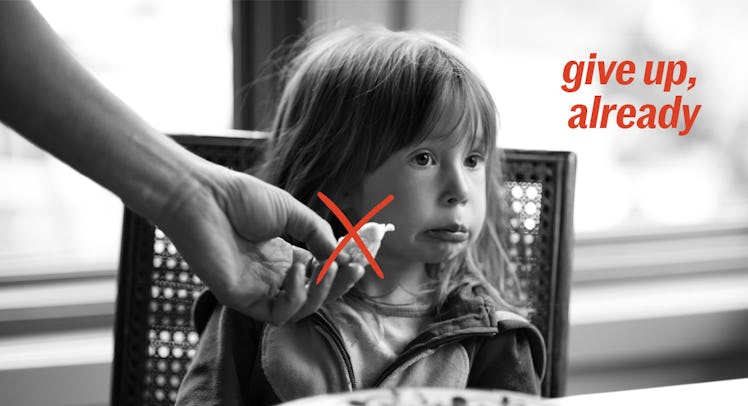Fighting with Picky Eaters is a Waste of Parents’ (and Kids’) Time
Parents get stressed about healthy food for kids, but arguing with picky eaters over dinner has got to stop. Peace at the table is better for everyone in the end.

Making healthy food for kids can feel like a form of performance art. One slices, spices, sautees, then discards. No, the kid does not want any broccoli or asparagus or filet mignon or zucchini. And, yes, this pisses you off — quite rightly. Every day, between the hours of 6 and 8 pm, dining room skirmishes erupt across America. How do we know this? Because we’ve lived it and because researchers bankrolled for some reason by Capri Sun have presented data showing that the average parent has 1,000 arguments a year with their kid over food. That’s a lot of time pleading, begging, pushing, blaming, cajoling, and yelling. It’s also a big old waste of time. Parents need to stop arguing about food, not because they’re wrong, but because it doesn’t work.
New research published recently in the journal Appetite from the University of Michigan School of Public Health goes a long way toward proving what smart parents have long suspected: Food harassment does not encourage kids to eat better. Arguments can inspire kids to double down on resistance or to avoid the family table or to resent their parents. What arguments don’t do is push kids toward the following thought: “I’d never considered vegetables from that perspective. I look forward to eating more of them in the future.” No kid has ever thought that.
Look, I understand that not arguing with kids about what they eat feels a lot like accepting defeat. But it’s really about choosing battles and understanding the enemy’s weakness (yeah, martial metaphors are weird when talking about caregiving). In this case, kids’ weakness is that they literally have to eat. However, they don’t have to eat very much and they don’t have to eat what you say. One of the bombshell findings of the Appetite study was that picky eating if left unchecked, does not lead to stunted growth or adversely affect development.
So, given that there aren’t real stakes to the food fights, why have them at all.
There are a couple reasons why picky eating doesn’t turn out to be a problem. First of all, we eat more calories that we need to on any given day. This is particularly true for children whose kid-food staples are generally packed with extra calories from sugar. Secondly, children will likely get the nutrients they need, even if they are eating small quantities of healthy food they like, such as fruits and certain veggies. It’s all a bit less complicated than the health nuts would have you believe.
The facts, of course, don’t solve the basic parental frustration that erupts from hearing a kid whine about their dinner or watching them glumly push a salad around their plate. When a kid greats a meal with disappointment, or disdain, it can often feel like ingratitude — a personal attack that must be met with defensive measures. Fortunately, there is a solution: Stop making family dinner about eating. The chewing and swallowing of foodstuffs really isn’t a communal event. The conversation is. So focus on that and don’t let that conversation get focused on food.
When a family is at the table, it’s one of the few times in the day where everyone is literally face-to-face. This is prime time for talking, laughing, listening and learning about each other. In fact, the benefits of family meals are less about nutrition than they are about social and emotional family health. Interestingly, studies correlate regular family meals with everything from higher scholastic achievement to lower risks of drug use. But those benefits can’t occur when the parents are red-faced with food frustrations and a child is in tears.
Parents need to fundamentally reframe how they look at the food on the plate. Does it fuel the family and provide nutrition? Sure. But, more importantly, the food acts as a binder. It’s what brings the family to the table. And as it’s consumed (or not) it also acts as a natural timer. When the parents finish their plates, the dinner is over.
Ideally, parents should follow the universal advice of pediatric nutritionists. Make a healthy meal, bring it to the table, and then allow the kid to eat or not. There should be no arguments, harassing, or deal-making. There should be talking about the day, games, and laughter.
So if you ever felt you needed permission to stop fighting with your kid about food. This is it. You’re free. You’re absolved. Go eat in peace.
This article was originally published on